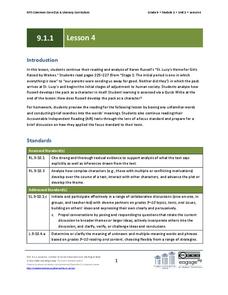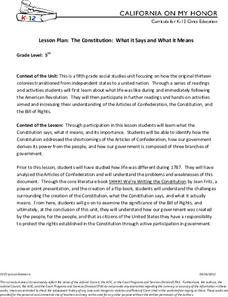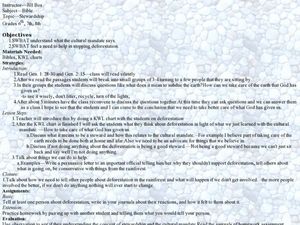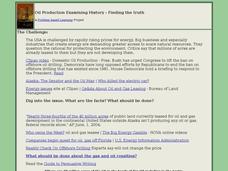Curated OER
How the Chipmunk Got Its Stripes: a Legend of the Iroquois
Have you ever wondered about a chipmunk's stripes? Read a short passage featuring the Iroquois legend about the chipmunk and his stripes, and answer five comprehension questions about the plot, the theme, and the unfamiliar vocabulary.
Curated OER
An Ideal for Which I Am Prepared to Die
English language learners have an opportunity to closely examine the academic language in portions of Nelson Mandela's famous 1964 Court Speech, "An Ideal for Which I Am Prepared to Die," with a lesson plan that looks at key passages...
EngageNY
Grade 9 ELA Module 1, Unit 1, Lesson 4
Connect with the text using helpful annotation strategies. As your class reads the first section of Karen Russell's short story, "St. Lucy's Home for Girls Raised by Wolves," they note important passages that establish character...
Fluence Learning
Writing an Argument: Is Electronic Communication Helpful or Harmful?
Technology has undoubtedly improved the lives of people around the world—but has it improved communication? Seventh graders read two informative passages about the rise of texting and emailing versus in-person conversations before...
K20 LEARN
The War of the Words: Grammar and Parts of Speech
Here's a lesson that adds some zip to a study of parts of speech. Class members read two versions of the same article, one loaded with evocative nouns, verbs, adjectives, and adverbs, while the other is missing this sensory language....
Teach-nology
Author’s Purpose: Persuade
Explore author's purpose with an activity about persuasive arguments. After reading a short passage about Spain, learners identify three main passages that the author uses to persuade the reader.
Turabian Teacher Collaborative
Parts of Argument II: Article Critique
Break down the parts of argumentative writing with a critical thinking activity. High schoolers read an article of your (or their choice), and use a graphic organizer to delineate the ways the author structures his or her arguments.
Judicial Branch of California
The Constitution: What It Says and What It Means
Learners get the chance to act as representatives to the Constitution Convention, and must decide whether or not to recommend your state ratify the new framework. After examining the Constitution line-by-line, they consider their...
Novelinks
The Crucible: Questioning Strategies Bloom's Taxonomy
Enrich your unit on Arthur Miller's The Crucible with a list of reading questions based on Bloom's Taxonomy. Kids answer questions and provide context for the knowledge, comprehension, application, analysis, synthesis, and evaluation...
Teach-nology
Author's Purpose
Challenge your class to find the three purposes for writing. After they read three short passages, kids note whether the author's purpose was to inform, persuade, or entertain.
Curated OER
Breaking the Ice: Who Controls the Northwest Passage?
Learners consider the global climate issue. In this Northwest Passage instructional activity, students examine who has sovereignty of the passage and discuss the importance of the Law of the Seas and its impact on the global climate...
Curated OER
Self-Assessment: Habits of Effective Readers, Writers, Speakers, Listeners, and Viewers
Fifth graders study how to read fluently. In this reading lesson, 5th graders practice reading and recording any miscues. Students time each other and graph their progress each day.
Florida Center for Reading Research
Comprehension: Text Analysis, Persuade, Inform, and Entertain Sort
Why do authors write? Practice determining the author's purpose with a categorizing activity. Learners sort twelve short passages into three categories: persuade, inform, and entertain.
National Woman's History Museum
The Equal Rights Amendment
The debate over the Equal Rights Amendment continues. To better understand the controversy, class members research the history of attempts to get the amendment ratified. In addition, pairs engage in a structured academic conversation...
Curated OER
Monster: Guilty or Not Guilty
Is Steve Harmon innocent or guilty? Examine the evidence with a worksheet based on Monster by Walter Dean Myers. As kids read the book, they note particular passages that they believe indicate whether or not Steve committed the crime.
Constitutional Rights Foundation
Plyler v. Doe: Can States Deny Public Benefits to Illegal Immigrants?
Illegal immigration is an ever-changing source of consistent controversy. A reading passage about the rights of undocumented workers and illegal immigrants—and the lack thereof—guides high schoolers into a mock trial activity. Three...
Curated OER
Examine Persuasive Elements by Reading, Analyzing, and Discussing Persuasive Text
Students identify persuasive strategies and analyze arguments. In this persuasive writing instructional activity, students read "Chief Red Jacket's Reply" and "Reverend Cram's Speech to the Iroquois Nation" and chart major elements of...
Curated OER
The Outsiders: Anticipation Guide
The Outsiders by S.E. Hinton is always a favorite for middle and high school readers because it addresses issues that hit home to them, decades after the book is set. Have learners fill out an anticipation guide that encourages them to...
Curated OER
Stewardship
Students explore deforestation and cultural mandate. In this stewardship lesson, students complete a KWL chart about deforestation and discuss how stewardship relates to the cultural mandate after reading silently in Genesis. Students...
Curated OER
Romeo and Juliet: To Tell, or Not to Tell
Should Romeo and Juliet have revealed their engagement to their parents? After reading Acts I and II of Shakespeare's Romeo and Juliet, your class discusses this question with a SMARTboard presentation (though the lesson still works if...
Curated OER
Oil Production Examining History - Finding the Truth
For this oil production worksheet, students click on the links to read about oil production and then answer short answer questions. Students also write a persuasive essay about what they think should be done.
Curated OER
Shizuko’s Daughter: Discussion Web
Is Yuki a selfish character? Analyze her motivation and behavior during a unit on Shizuko's Daughter by Kyoko Mori. Readers fill out two sides of a graphic organizer with reasons why or why not she is selfish, and then come up with a...
Prestwick House
Understanding Language: Slant, Spin, and Bias in the News
We live in a time of fake news, alternative realities, and media bias. What could be more timely than an activity that asks class members to research how different sources report the same topic in the news?
Prestwick House
Rhetorical Devices in Political Speeches
Have you ever watched a political speech and felt your heart beat a little faster, and your opinion either solidify or begin to slightly change? Rhetorical devices can be a strong tool in an effective and powerful speech. A short lesson...

























